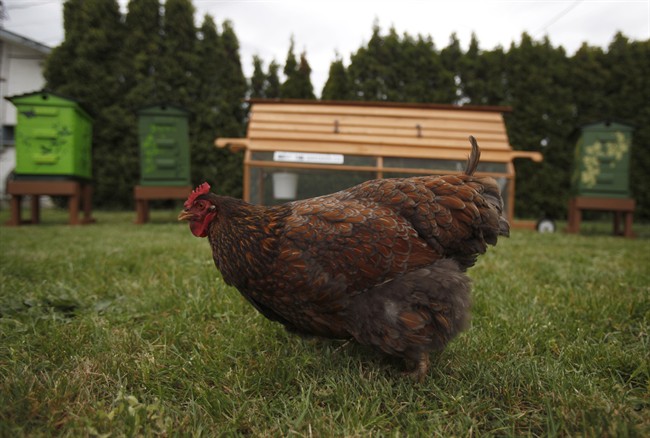The third debate in a decade over backyard chickens in London, Ont., appears to be the shortest yet.

Members of the Community and Protective Services (CAPS) committee spent less than five minutes discussing the matter on Tuesday before voting unanimously to take no further action.
The push to renew the debate came from Londoner Sean Eden, who sent a letter to the committee requesting that the city launch a one-year pilot project to allow citizens to raise their own chickens — not roosters — “in order to secure a supply of eggs and hens for their own consumption.”
In his letter to the CAPS committee, Eden cited various media reports on threats to food security resulting from the novel coronavirus pandemic and also argued that newly-formed hand-washing and hygiene habits resulting from the pandemic are “more than adequate to cope with the objections that have been previously raised about chickens.”
“What got me thinking about this was, you know, a few months ago when the lockdown started with the quarantine, I remember one day going to like three or four grocery stores just to find a pack of eggs,” Eden told Devon Peacock on The Morning Show on Global News Radio 980 CFPL.
“A lot of that has calmed down now with a lot of the restrictions that have been put in place about hoarding food. But I just thought maybe it was a good idea to just get the conversation started about food security.”
Eden said he reached out to his aunt, who has a flock of chickens at her cottage on Manitoulin Island, as well as to online community groups to gather more information.
“I know the main concerns are obviously roosters, which, you know, a lot of cities don’t allow, which makes sense because of the noise. And then also salmonella poisoning and from what I’ve heard, speaking with my aunt and also with these different groups online, is that as long as you follow proper precautions and keep the coop clean with weekly cleanings, it’s not really much of an issue. And I think too now with all the precautions we’re taking with COVID-19, this would probably be something that would be manageable for most people.”
Benjamin Hill, chairperson of the Middlesex London Food Policy Council, noted that backyard chickens are “controversial” and come with issues surrounding sanitation and manure control as well as concerns over predators.

Get weekly health news
“If you’re going to have backyard chickens, part of the idea is not to cram them into cages like you would in commercial chicken operations. There’s a large cost for setting up a backyard chicken coop, it could easily run $4,000 or $5,000 to set up the space for chickens. And there’s a large labour costs, they require a lot of work,” said Hill.
“So it’s not accessible to everybody, but the people that have the time, that have the money and the space are very enthusiastic about backyard chickens.”
Hill also argued that food insecurity is more of a “political distribution issue” and not a “food production issue.”
“It takes time and it takes a commitment to build the relationships and the infrastructure and to provide the proper supports for operations within the city. There’s a lot of city land that can be used for agriculture. A lot of city land is used for a cash crop agriculture, a lot more could be used to raise food to be sold within the community. So I think those are a lot of issues that are being talked about at all levels in the community right now.”
Committee members had no appetite to revisit the issue on Tuesday. Eden’s request was quickly shot down with committee members voting unanimously to receive the letter and take no further action — a decision that still needs to be approved at the next full council meeting.
“This has been dealt with in the past by a prior council and I think the community spoke very clearly,” said Holder.
“We had input in the past from the health unit and others about some of the challenges associated with this. Frankly, I don’t want to spend any more time on it.”

London’s backyard chicken debate began in 2010 with a request that the city make an exception to existing bylaws to allow a woman who was paralyzed to keep her chickens.
Then-councillor Stephen Orser suggested the city look into amending the Animal Control By-Law, which prohibits chickens — along with ducks, geese and turkeys — as animals from being kept anywhere in the city except on agricultural land or under a special grandfathering clause for any chickens operations that existed in the annexed areas prior to 1993, as noted in a blog post at the time from the late Gina Barber, a former city controller.
The debate soon grew to allow all Londoners to have a backyard coop but despite multiple attempts, Orser failed to gain any traction on the issue. As previously reported, the prospect of backyard chickens didn’t resonate with Londoners and was seen as a secondary issue as the city continued its recovery from the financial crisis of 2008. However, the woman at the centre of the debate was allowed to keep her chickens.
In 2017, the debate was reignited when a report to the planning and environment committee recommended city politicians approve the Urban Agriculture Strategy, which included a backyard chickens pilot project.
By that time, a handful of municipalities in Ontario had already gone ahead with the initiative. The city of Toronto approved a pilot project of its own in Oct. 2017, while Brampton, Niagara Falls, Kingston and Caledon all allowed residents to keep chickens in backyard coops.
The backyard chicken pilot project portion of the Urban Agriculture Strategy was later axed from the strategy, which was otherwise unanimously endorsed.
— with files from Global News Radio 980 CFPL’s Devon Peacock.












Comments
Want to discuss? Please read our Commenting Policy first.